Showing 1-10 of 66 results
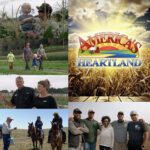
Farming Strategies for Adapting to Extreme Weather
SARE partnered with PBS KVIE to produce an episode of RFD-TV's America's Heartland that highlights how farmers and ranchers across the United States are using sustainable and regenerative practices to adapt to increasingly challenging and unpredictable weather conditions. Adapting to Flooding and Drought on Hurricane Flats Farm in South Royalton, Vermont Ashley Loehr and Antoine […]
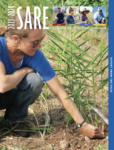
2023–2024 Report from the Field
SARE grants havehelped our viabilityas a business anddemonstrated thatsmall businessescan make a positiveimpact on theenvironment when wedevelop relationshipswith each other forthe benefit of all. Jeanine SeabrookGlass Rooster Cannery Letter from the Director I have always appreciated the value of long-term research as well as the long-term impact of both applied and basic research. The core […]
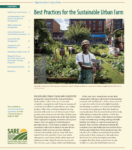
Best Practices for the Sustainable Urban Farm
For decades, urban farms and community gardens have helped meet the demand for fresh, local produce. Urban farms are diverse and adaptable, ranging from small farms on repurposed vacant lots to multilevel vertical farms and rooftop gardens. Often, they combine ecological farming practices with some form of infrastructure. Urban growers make clever use of their […]

Concepts and Research-Based Guidelines for Forage-Livestock Systems in the Southeast Region
This guide provides concepts and research-based information on animal, environment, forage and soil topics for Extension educators and producers in the Southeast. Forage production proves to be a major challenge for livestock producers as seasonality affects the foraging systems. This manual offers guidelines and research-based information to create a productive livestock system in the Southeast […]

Grazing Networks for Livestock Producers
Grazing networks promote a mutual self-help approach to learning that is based on shared local experience and that provides several benefits to participants. This publication offers suggestions for finding or starting a grazing network and provides examples of the kinds of activities grazing networks might conduct. It also contains recommendations for sustaining a grazing network […]
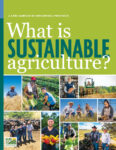
What is Sustainable Agriculture?
This award-winning report provides a sampler of best practices in sustainable agriculture—from marketing and community vitality to cover crops and grazing—as well as eight profiles of producers, educators and researchers who have successfully implemented them.

Leaders in Sustainable Agriculture Featured on America's Heartland
SARE partnered with PBS KVIE to produce an episode of RFD-TV's America's Heartland that features four farmers describing their commitment to sustainability, how they plan to meet farming challenges of today and tomorrow, and how SARE has impacted their farming and ranching practices. The full 24-minute video is available, as is each segment featuring the […]

Manage Weeds on Your Farm Video Series
In this series, experienced farmers from around the country talk about how they have found success controlling weeds by following ecological principles, and without resorting to the use of herbicides. To do so, they rely on a range of cultural and mechanical practices, including diverse crop rotations, well-timed cultivation and targeting weeds when they're at […]
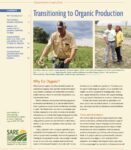
Transitioning to Organic Production
Transitioning to Organic Production lays out many promising conversion strategies, covering typical organic farming production practices, innovative marketing ideas and federal standards for certified organic crop production.
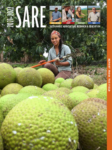
2021–2022 Report from the Field
Report from the Field features 12 stories from around the country of recent SARE grantees who are finding new ways to improve the sustainability of U.S. agriculture. The report also summarizes our total investment in research and education projects since 1988.